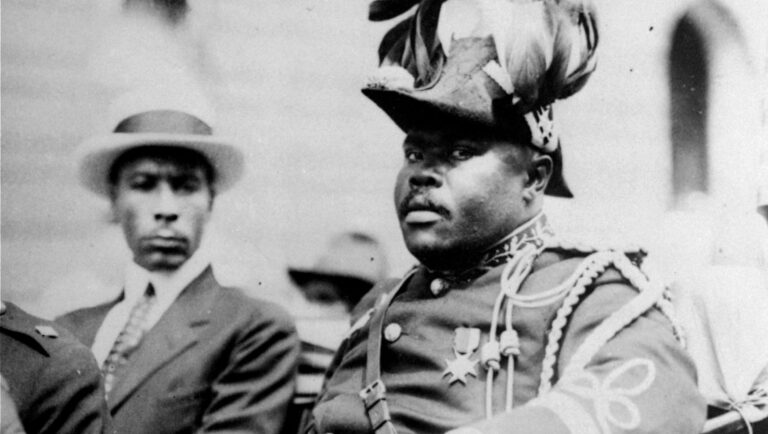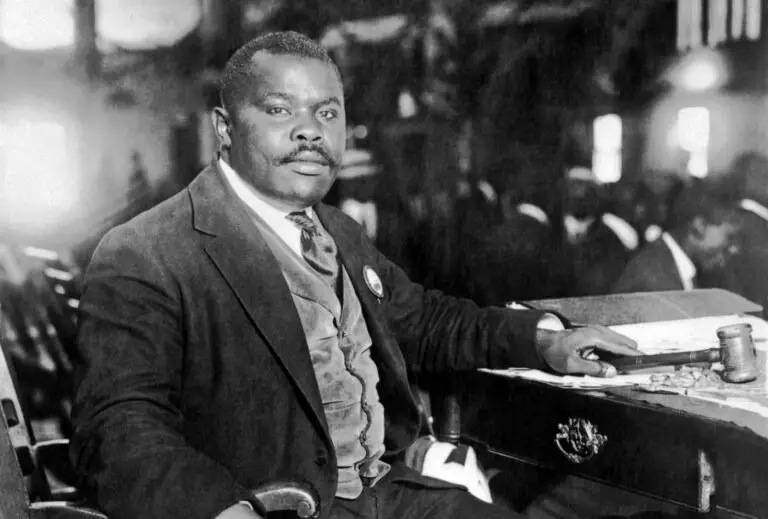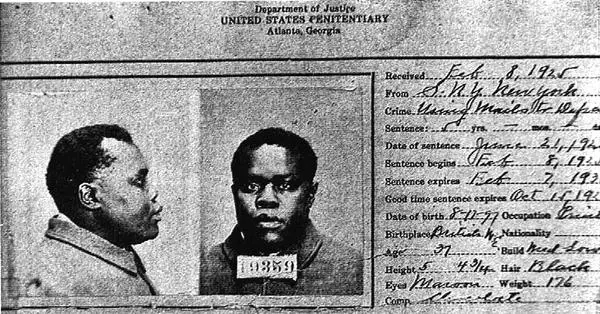As part of NYS Music’s continuing series looking at the Centennial years of the Harlem Renaissance, we turn to activist Marcus Garvey, leader of the Pan-African movement, the first American Black nationalist movement.
Marcus Moziah Garvey was born in St Ann’s Bay, Jamaica on August 17, 1887. His father, Marcus Garvey Senior, was a stonemason and his mother, Sarah Jane Richards was a household servant. Garvey had 11 siblings but was the only one to survive to adulthood. Attending a local church school until the age of 14, Garvey then moved to Kingston where he worked in a print shop as an apprentice. Garvey quickly rose through the ranks and became the first Afro-Jamaican foreman. Thus began Garvey’s fabled career in activism, becoming a trade unionist and partially leading the November 1908 print workers’ strike.
After being fired from his print shop job, Garvey’s hatred for the societal structures creating inequality began to form. Garvey joined the National Club, one of Jamaica’s first nationalist organizations, publishing several pamphlets and magazines campaigning for the removal of the British Governor of Jamaica. Economic hardship took hold of Jamaica, leading to a mass exodus that included Garvey. After Garvey spent several years traveling, including living with family in Costa Rica and attending University of London’s Birkbeck College, Garvey returned to Jamaica.

Birth of the UNIA
Upon returning to Jamaica, Garvey formed the UNIA (Universal Negro Improvement Association). An organization whose goal was to “Establish a brotherhood among the black race, to promote a spirit of race pride, to reclaim the fallen and to assist in civilizing the backward tribes of Africa.”
With this organization, Garvey wanted to establish a country that would unite black people all over the world. After coming on to contact with fellow famed civil rights activist Booker T. Washington, Garvey moved to Harlem to establish the UNIA in the United States.
As the UNIA began to grow, Garvey launched his own weekly newspaper Negro Weekly. The newspaper reached worldwide audiences, nearing 10,000 copies circulated by the end of its first year. In 1919, Garvey launched his shipping company Black Star Line. The company’s goal was to establish trade and commerce between Africans all over the world. By this point, the UNIA had grown to over 4 Million members. The Black Star Line bought the S.S. Yarmouth, which they renamed it as the S.S. Frederick Douglass, in preparation for the group’s ambitious program which sought to establish a country for former slaves in Liberia.

Enemies
Garvey was infamous for his impassioned and controversial speeches which caused him many enemies from the likes of fellow activist, W.E.B. Du Bois, to FBI Director J. Edgar Hoover. Dubois was vehemently against Garvey’s separatist philopshy, going so far as to call him “The most dangerous enemy of the Negro race in America.”
Garvey was under surveillance from Hoover for several years. Hoover looked for any dirt he could dig up on Garvey, going so far as to hire the first black FBI agent to infiltrate the ranks. Hoover would use the same method against several civil rights leaders throughout the 20th century including Martin Luther King Jr. and Malcolm X. Eventually, Hoover was able to try Garvey and others within the Black Star Line with Mail Fraud. Garvey was found guilty and sentenced to five years in prison.

Imprisonment and Deportation
Before the trial, Garvey controversially had agreed to meet with the leader of the Ku Klux Klan, believing they had common ground when it came to Segregation. Garvey blamed the Jewish judges and jurors for his convention, claiming they held bias against him for agreeing to meet with the Ku Klux Klan leader. This began a trend of Garvey siding with segregationists. While in jail, Garvey wrote his famous letter “First Message to the Negroes of the World from Atlanta Prison.”
Garvey was released in 1927 after serving just three years of his sentence after President Calvin Coolidge received a petition with 70,000 signature demanding for his release. Upon release, Garvey was immediately deported back to Jamaica. Continuing his political activism in his home country, Garvey created the country’s first political party, the People’s Political Party (PPP). The party ran on the platforms of establishing a minimum wage and the ability to impeach and imprison corrupt judges. The party quietly faded away after Garvey lost the election and was imprisoned again for seditious libel.
Never forget that intelligence rules the world and ignorance carries the burden. Therefore, remove yourself as far as possible from ignorance and seek as far as possible to be intelligent.
Marcus Garvey
Later Life and Death
Never again was Garvey able to convey the same amount of influence that he once did. Garvey continued his political activism in Jamaica until 1935 when he moved to London. Garvey would go on to back other segregationist legislation such as The Greater Liberia Act of 1939, championed by infamous white supremacist Mississippi Senator Theodore Bilbo; this act sought to deport 12 million African Americans to Liberia under the justification that it would reduce unemployment. The bill never passed.
In January 1940, Garvey suffered a stroke that had left him paralyzed almost entirely. Word spread that Garvey had died, leading it to be reported in several papers. Garvey had a second stroke brought on from the reading of these headlines, leading to his actual death on June 10th, 1940 at the age of 52. Garvey was buried in London due to WWII travel restrictions but his remains were moved to Kingston, Jamaica in 1964.
Legacy
Marcus Garvey has a complicated legacy like no other civil rights figure. Garvey’s key message was one of African Pride, to love your self and heritage no matter what. Phrases coined by Garvey such as “Black is Beautiful” are still commonplace motivational statements today. On the other hand, Garvey was one of the most outspoken segregationists. Garvey sided with white supremacists on several occasions, even backing key legislature. While his aspirations of a unified African American nation might have been pure, the ways he went about achieving those goals were destructive. Marcus Garvey the man may be controversial, but his word would go on to influence generations of activists and spur change all over the globe.


Comments are closed.